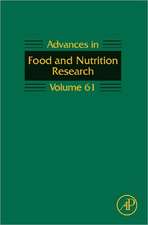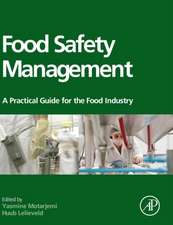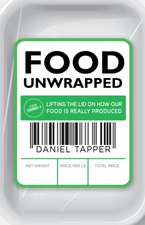Food Safety: Emerging Issues, Technologies and Systems
Autor Steven Ricke, Janet R Donaldson, Carol A Phillipsen Limba Engleză Hardback – 27 iul 2015
- Examines effective control measures and molecular techniques for understanding specific pathogens
- Presents GFSI implementation concepts and issues to aid in implementation
- Demonstrates how operation processes can achieve a specific level of microbial reduction in food
- Offers tools for validating microbial data collected during processing to reduce or eliminate microorganisms in foods
Preț: 566.56 lei
Preț vechi: 695.81 lei
-19% Nou
Puncte Express: 850
Preț estimativ în valută:
108.41€ • 113.49$ • 89.70£
108.41€ • 113.49$ • 89.70£
Carte tipărită la comandă
Livrare economică 29 martie-12 aprilie
Preluare comenzi: 021 569.72.76
Specificații
ISBN-13: 9780128002452
ISBN-10: 012800245X
Pagini: 464
Dimensiuni: 191 x 235 x 25 mm
Greutate: 1.02 kg
Editura: ELSEVIER SCIENCE
ISBN-10: 012800245X
Pagini: 464
Dimensiuni: 191 x 235 x 25 mm
Greutate: 1.02 kg
Editura: ELSEVIER SCIENCE
Public țintă
A&G and Industry markets; industry professionals in food microbiology, food science meat science food safety and food production; government officials (USDA, FDA, etc.); grad students in agriculture and food science; corporate managers in food companiesCuprins
Section 1: DEVELOPMENTS IN FOOD SAFETY TRACKING AND TRACEABILITY
1. Global food safety initiative: Implementation and perspectives
2. Computer systems for whole-chain traceability in beef production systems
3. Foodborne pathogen tracking in the produce environment
4. Application of molecular methods for bacterial traceability in food safety systems
5. A descriptive tool for tracing microbiological contaminations
6. Salmonella and the Potential Role for Microbial Process Indicators on Chicken Carcasses
Section 2: NEW STRATEGIES FOR STUDYING FOODBORNE PATHOGEN ECOLOGY
7. Strategies for understanding Salmonella ecology in food production
8. Listeria and omics approaches for understanding its biology
9. Current issues in foodborne Staphylococcus ecology
10. Shiga Toxin-Producing E. coli and ruminant diets: a match made in heaven?
11. Current perspectives on Campylobacter ecology
12. Arcobacter species- an emerging or emerged food pathogen?
13. The Cronobacter genus – an emergent bacterial pathogen comes of age in the genomic era
14. New and Emerging Food Pathogens
Section 3: NEW DEVELOPMENTS IN FOOD SAFETY EDUCATION – FOOD SYSTEMS AND TRAINING
15. Food Safety at Farmers Markets: Fact or Fiction?
16. Novel Approaches for Retail Food Safety Education
17. Approaches to Food Safety Education Among Critical Groups
18. The role of training strategies in food safety performance: Knowledge, behavior and management
19. Teaching Gastrointestinal Microbiology to a Food Safety Audience
20. Systems thinking and beef cattle production medicine – Issues of health and production efficiency
21. Food safety training and teaching in UK/Europe
1. Global food safety initiative: Implementation and perspectives
2. Computer systems for whole-chain traceability in beef production systems
3. Foodborne pathogen tracking in the produce environment
4. Application of molecular methods for bacterial traceability in food safety systems
5. A descriptive tool for tracing microbiological contaminations
6. Salmonella and the Potential Role for Microbial Process Indicators on Chicken Carcasses
Section 2: NEW STRATEGIES FOR STUDYING FOODBORNE PATHOGEN ECOLOGY
7. Strategies for understanding Salmonella ecology in food production
8. Listeria and omics approaches for understanding its biology
9. Current issues in foodborne Staphylococcus ecology
10. Shiga Toxin-Producing E. coli and ruminant diets: a match made in heaven?
11. Current perspectives on Campylobacter ecology
12. Arcobacter species- an emerging or emerged food pathogen?
13. The Cronobacter genus – an emergent bacterial pathogen comes of age in the genomic era
14. New and Emerging Food Pathogens
Section 3: NEW DEVELOPMENTS IN FOOD SAFETY EDUCATION – FOOD SYSTEMS AND TRAINING
15. Food Safety at Farmers Markets: Fact or Fiction?
16. Novel Approaches for Retail Food Safety Education
17. Approaches to Food Safety Education Among Critical Groups
18. The role of training strategies in food safety performance: Knowledge, behavior and management
19. Teaching Gastrointestinal Microbiology to a Food Safety Audience
20. Systems thinking and beef cattle production medicine – Issues of health and production efficiency
21. Food safety training and teaching in UK/Europe
Recenzii
"...attractively produced and authoritative…useful to those starting careers in food science as they are to established specialists. An excellent book." --Food Science & Technology








